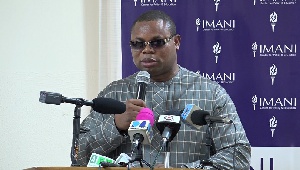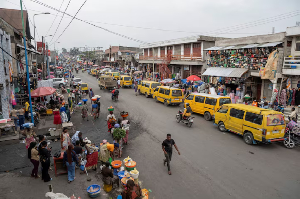Five parliamentarians ponder over impending action on energy, industry, waste and unemployment
Introduction
I am an artist, an educationist, a writer of visual arts books and a believer in the practical aspects of issues more than the theory. I read a lot about science for pleasure and knowledge, especially on agriculture, medicine, physics, biology, and particularly, what make things work. I place science and art on the same pedestal because I have the conviction that it is the combination of the two that has brought about all the numerous technological achievements by man. Yet science is a core subject, and art, the subject that fosters creativity, is not a core subject at even the junior high school level. To me, that may perhaps, partly explain why we are in such a mess as a country. In the senior high schools, the visual arts department is only remembered at impending speech and prize-giving days, yet there is no gainsaying that the dumbest students are dumped there. The only few interested clever ones are dissuaded by teachers and even heads from pursuing art because according to them, art does not need any serious thinking. I hope our policy makers may consider and make their own research about this notion by finding out from some of the developed countries where art is not considered as an inferior subject.
I am thinking about four issues that have been bothering most Ghanaians all along and which need immediate solutions but which appear not forthcoming. I believe that it is probably because in the past, we have failed as a nation to take bold and pragmatic measures such as what I am about to put forward that we are still in such a mess. The following issues were forwarded to a minister and the president some time ago and I am glad to hear that some action is about to be taken, great!
Energy
I can bet you that with the exception of those who have been benefiting from the inadequate supply of electricity such as importers of generators and flashlights, as well as operators of fuel filling stations and maybe charcoal burners, majority of discerning Ghanaians would absolutely agree with me that the use of renewable energy is the best for our country. A lot has been said about the merits and demerits of such energy sources as solar, wind, wave, hydro, coal, nuclear, geothermal, fuel cell and so on. I believe that there is a simple way to improve the energy supply in Ghana if only our legislators would be willing to make the following simple law for all public institutions to implement.
Even though I do not have the technological know-how about the processes involved, neither do I know the estimated cost per unit, nor the number of years that it may last, I can vouch that the use of biogas can be singled out as the most logical approach for us to consider now and begin with, as we continue to find ways to solve the energy problem. To me, it is the most sustainable, reliable and never-can-fail energy source.
No one can deny the fact that so far as it is our desire to continue to survive as human beings, we need to eat and subsequently cannot contain, but have to evacuate the waste contents of our bowels. The resultant putrefying excreta produces biogas, which goes into the atmosphere free. The technology of tapping biogas into some receptacle and connecting it with the appropriate piping and other accessories to generate power has long been developed and therefore does not need any new experimenting with. Thus, guided with prototypes, I am quite confident that graduates from our universities and polytechnics or even students would be capable of constructing or assembling biogas equipment without much difficulty.
There are a thousand and one public institutions that harbour masses of people such as schools, prisons, hospitals, etc. spread over the whole country. I am beginning to imagine and speculate on the volume of excreta that emanates from all the inhabitants or residents of those institutions and more importantly, the amount of biogas that goes waste, I may say, because of our failure to trap and utilize it. If all these institutions were made to install biogas equipment within a period of say, two years, after which date the heads of all those institutions that fail to implement the directive would be dismissed, I believe that we would be heading somewhere, don’t you think? And probably, gradually, public or community toilets can be added when we begin to see the good results of this thing.
Undoubtedly, the provision of the materials for the projects should be the responsibility of government, but in case government cannot immediately find the money, as is often the case here in Ghana, is it not possible to undertake a memorandum of understanding with established contractors or entrepreneurs to install the equipment and later get paid, or even an option opened for them to generate power and sell over a number of years to defray the cost? Why can’t the details be worked out if only we are desirous about this?
And it may not be surprising that philanthropists, non-governmental organizations, old boys and girls associations, development partners, churches and individuals may not hesitate to assist in this national programme if they realize that some effort is being made by government to ‘fix’ the energy crisis.
Thus with a simple law binding all public institutions, power can be generated to supplement other sources at a reduced cost, I believe.
Industry
We always talk about industries but do little about how to go about them. We have a variety of plants, animals and minerals located at different areas in the country. Some areas are endowed in some commodities more than other areas and also certain commodities appear to have become localized in certain districts. For example even though tiger nuts can grow in many places in Ghana, the product is mainly found in the Kwahu area. What I am driving at is that we can make legislation about the natural endowments in the following manner:
Each district assembly identifies two commodities, which could be plant, animal or mineral. For example, shallots and shrimps at Battor, coconut and lemon at Enchi, salt and grass cutters at Ada, cattle and cassava at Salaga, cola nuts and snails at Jukwa, leather and tanning and groundnuts at Sandema, plantain and oil palm at Mankranso, snails and bananas at Kintampo, solid waste and choked gutters in Kumasi and so on. In short, each district specializes in some two selected products. Now, in collaboration with the traditional authorities in the districts, hectares of land are acquired by the district assemblies for the commodities as well as the processing equipment. But here comes another problem to contend with; considering the spate of land disputes hovering around our necks, would our traditional rulers be enthusiastic, willing and prepared to release free land for such projects?
The preparation, growing or rearing of the approved commodities and the building of factories can be earmarked for say, three years, so that processing into semi-finished or finished products can begin, depending on the type of commodity involved. The by-products such as coir from coconut, corn stalks and shucks, palm-nut chaff and shells, groundnut shell, plantain and banana stems, etc. may be transported to other districts where they would be needed for further processing into products such as paper, sacking, upholstery filling, animal feed, fertilizer or whatever.
Here too, if money for the projects cannot be found by the district assemblies or government immediately, Ghanaian entrepreneurs can be brought in as above. The growing, rearing or mining as well as processing the commodities are undertaken by the inhabitants of the districts. Thus migration to the cities may be minimized, inter-district trade may be encouraged or boosted, extra and exportable products may be exported and well, you may now begin to imagine all the other benefits that may come out if prudent measures are taken.
Waste Disposal
With regards to the waste issue, I am quite sure that all the necessary legislation and by-laws already exist and we only need to enforce them. What we need to do, or add, is for the district assemblies to advertise for people who are ready to take up the challenge as volunteers to apply. We don’t use the assembly workers because they are purported to let people go free without punishment. Yes, and we use volunteers because it has been proven that certain types of work are usually done better with volunteering. And then, particular streets or designated areas are assigned to them according to the volume of garbage in the locality, ranging from say, one or two volunteers to a street and about ten or more in potentially heavy areas. Their duty is to capture or arrest offenders using such means as getting witnesses, neighbours and helpers from the locality, or taking pictures, or making videos of offenders to support reasons for arrest and probably making the culprits sign some sort of form. The assemblies may equip the volunteers with the necessary gadgets such as mobile phones for recording scenes, with the cost of the phones being deducted from the earnings that the volunteers would get from fines to be imposed by tribunals.
The special fast track tribunals set up for judging pollution cases, including noise pollution, would fine offenders a maximum of twenty Ghana cedis; I always feel uncomfortable adding Ghana to cedis. In fact, the system may not work if the fine is too high, I bet you. I think that the fine should also depend on the volume of waste, don’t you think so? For example, waste up to one kilo should be fined twenty cedis, that between one and two kilos should be thirty cedis, between two and three kilos, forty cedis and so on. Naturally, because of the long standing non-enforcement of our laws, there are bound to be initial conflicts between offenders and the volunteer capturers. Some of us, the recalcitrant ones, may not be deterred, so second offenders would have to pay double, that is forty cedis; third offenders pay double of the amount paid for the second offence, that is eighty cedis; fourth offenders pay double of what was paid for the third offence, that is one hundred and sixty cedis; fifth offenders pay three hundred and twenty cedis, and so on. Fifty percent of whatever is fined is given to the volunteer; thirty percent goes to the district assembly and twenty percent goes to the state. Let this action continue indefinitely and you would realize that naturally, gradually, the rampant disposal of waste with impunity will diminish and, and, and … how about that? And maybe we wouldn’t need to engage ourselves in any national sanitation days any longer, would we?
Public education or some sort of warning for about three months can go on by the district assemblies, the media, N.C.C.E. etc, to precede the implementation of the law so that we don’t get human rights activists intervening or disrupting progress as is usually the case when such matters arise here in Ghana.
And what do we do with the gathered waste if people begin to comply and obey the law by dumping their garbage at the appropriate places? Sell it to the Norwegians, of course… Why? This is because we have failed to put waste to good use and continue to grapple with its disposal in this country and according to what I hear, Norway buys waste!!! I have been wondering whether any entrepreneur has been considering placing empty containers at the several coconut selling points in order to take the coir free to turn into strawboards, for example.
Unemployment
It is a well known fact in our tertiary institutions that most of the plausible or feasible research findings are shelved with no tangible reasons except perhaps due to the fact that the idea did not come from ‘them’ in the first place, or jealousy, or selfishness, or sabotage, or…? Obviously, unemployment is one of the problems that the government is grappling with that needs to be addressed immediately. Therefore it should be a relief to both government and the people if something new emerges that can provide some jobs. Does is really matter how many people are gotten involved or the duration for the three projects described and proposed above?
And so what? And so in theory, haven’t I been able to create jobs on paper as I said? Yet I am afraid that only a few would mind sending rejoinders. We only have to make the appropriate laws and more importantly, implement them and the foreign exchange would flow as a result!!!
But please, for posterity sake, let the action… yes, I mean would you help make the practicals begin!!!
Conclusion
So you see my friend, as a potentially wealthy nation, it isn’t difficult for us at all to develop, depending on how hard we can lobby and push for policies so that we implement what is good for all of us but not individuals. We wouldn’t have been facing such seemingly insurmountable circumstances if such measures had been taken in the past regardless of whether some government had wanted to continue ruling or not. I would want to believe in a government that would wish to be in office for only one term but would made sure that all laws were obeyed. I bet you that such a government would get a further mandate of the people if seen to have brought some sanity into the system for taking such measures.
I hope that if only five (005) out of the two hundred and seventy-five (275) parliamentarians would read this, and more importantly, if these five were to begin thinking like me, then maybe they may also begin to consider and ponder over these ideas, come together, add their own or further and better ideas, or modify these proposals and push them through for whom, me?
Kwaku Ameyaw-Benneh email - dambouer53@gmail.com
Opinions of Friday, 9 October 2015
Columnist: Ameyaw-Benneh, Kwaku
Five parliamentarians ponder over impending action on energy ....
Entertainment













